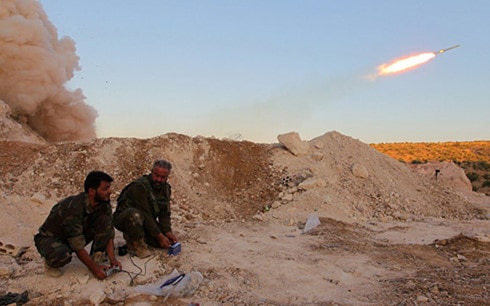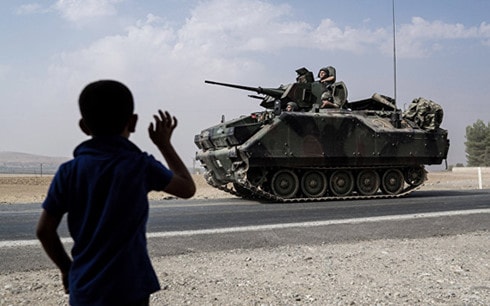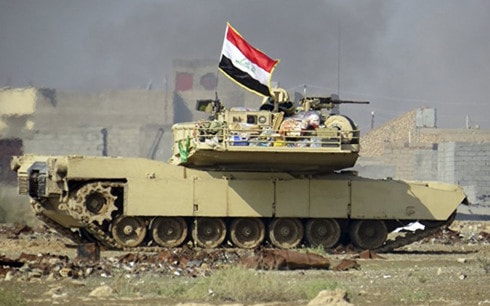10 wars 'offspring' of the fight against IS
In the context of the rapidly shrinking territory of the terrorist organization IS, the world is facing 10 war scenarios arising from the fight against IS.
The US strategy to defeat the self-proclaimed “Islamic State” (IS) relies on regional allies and local armed groups that are often at odds with each other. Although all see IS as an enemy, most are hostile to each other.
Once they enter terrorist territory, they try to seize it, creating the risk of conflict with other militants. New wars are emerging for control after IS.
 |
| Free Syrian Army (FSA) fighters launch a "Grad" missile at government forces in Hama province. Photo: Reuters. |
DUhHeythatylahnameSahch 10 lifewarnew"involved" in the fight against IS.Among these onenumberlifewarSatisfiedcatchDNo.periodlifewarnahoAll of these can increase the chances of survival.IS,createDenoughlawsuitgivenestfunctionterribledadnahyphahtdevelopment,vahcohbodymakeFlowerPeriodboginareaarea for many years:
Thewarrankbest: BetweenforcelUhyesngUhHeyKurdliveSyria(right)yesAmericabootshousehold)vahforcelUhyesngUhHeyArab(right)yesEarthNhĩPeriodbootshousehold)
This is one of the wars that has already begun and is also one of the most complex. Turkey, which is waging a war against Kurdish separatists, has expressed concern as Syrian Kurds have used US support to expand their control of northeastern Syria. Syrian Arab rebels, allied with Türkiye, are also fighting Kurdish expansion into Arab territory.
So when Türkiye sent troops into Syria not long ago to help rebels capture IS-held territory, it was clear the Kurds were as much a target as IS. The fighting has since intensified, and while the US has urged both sides to stand down, it is unclear whether it has the clout to influence its allies to avoid further escalation.
Thewarrank 2:BetweenEarthNhĩPeriodvahngUhHeyKurdliveSyria
This war is similar to the first, but on a larger scale. Türkiye has so far limited its military presence in Syria to the IS-held areas, which are predominantly Arab. However, Türkiye is also uneasy about the formation of a Kurdish state along its eastern border.
The Kurds declared an autonomous region there earlier this year, and Türkiye is currently building a wall along the border to seal it off. If tensions continue, Turkey cannot rule out a direct military incursion into the Kurdish region, where a small number of US troops are stationed.
 |
| CartangEarthNhĩPeriodDangprogressaboutballhallongenderSyria.Image:AP. |
ThewarTuesday:BetweenngUhHeyKurdliveSyriavahChínhcoverSyria
The Syrian government also feels threatened by the Kurds because of their territorial ambitions. Until recently, they had supported a complex alliance, and Syrian President Bashar al-Assad boasted that his government had on several occasions supplied the Kurds with weapons. But relations soured after the Kurds declared autonomy, with both sides fighting brief battles in areas where forces are stationed. A ceasefire remains in place, but the Kurds’ push for autonomy conflicts with Mr. Assad’s stated goal of restoring Syrian sovereignty over the whole country.
Thewarrank 4:BetweenFlowerPeriodvahSyria
This war could have broken out at any time in the past five years, ever since US President Barack Obama called for the overthrow of Syrian President Bashar al-Assad. However, it has not happened, possibly because both sides want to avoid conflict. It is still considered unlikely to happen. But there are some lines of demarcation where the fight with IS could at some point lead to direct conflict between US-backed rebel groups and Syrian government forces.
Among them is the IS capital of Raqqa (Syria), where in June the US and Syria supported attacks from opposite directions. In August the US military used aircraft to prevent Syrian military aircraft from bombing the Kurds.
Thewarrank 5:BetweenEarthNhĩPeriodvahSyria
Türkiye’s military intervention in Syria is currently constrained by the fight against ISIS and the Kurds. Türkiye has also taken steps to improve relations with Russia and Iran, Assad’s most important allies (which appear to have given Turkey a green light to intervene in northern Syria). But if Turkey’s fight against ISIS goes well, Turkish troops could soon come face to face with Syrian government forces near Aleppo. And then things could get serious.
The 6th War:Between the Iraqi Kurds and the Iraqi Government
Along the shrinking IS border to Syria’s eastern flank in Iraq, the situation is slightly less volatile, but no less complex and dangerous. Syrian Kurds have expanded their territory in ways that threaten Syrian government sovereignty, while Iraqi Kurds have moved into areas of Iraq that were once under government control.
The US-backed Iraqi government has declared its intention to reclaim these lands after IS is completely destroyed. Meanwhile, the US-backed Kurdish forces have declared that they will not give back any of the land they fought for. These disputes existed until the rise of IS, and they will resurrect twice after the defeat of the terrorists.
 |
| Iraqi troops fight against IS with the support of US air force in Akbar province. Photo: |
The 7th War:Between Iraqi Kurds and Shiite militias
This war could have happened for many of the same reasons as the sixth war, but it has a different twist: it has already begun. Shiite militias (many of them backed by Iran) are taking part in some of the campaigns to capture IS territory. They are advancing north of Baghdad to drive out the terrorists. They are also fighting US allies, including Kurdish Peshmerga fighters, who are pushing south from Kurdish territory. At least in one area, Tuz Khurmatu, there have been clashes. But the Kurds themselves are not unified in Syria or Iraq, so another war is still possible.
The 8th War:Between Kurds and Kurds
This is perhaps the most complicated scenario of all, and it is entirely possible. The Kurds are divided on everything except the creation of a Kurdish state. The Kurds in Iraq are divided into two groups that fought a bloody civil war in the 1990s. One is a sworn enemy of the Kurds who control northern Syria. The other is an ally of the Kurds in Syria. Conflict between the Kurdish groups (all US allies) is possible in Iraq, Syria, or both.
The 9th War:Sunni Arabs against Shiites or Kurds
While fighting IS, Sunni-dominated cities and villages were overrun by largely Kurdish or Shiite forces. Many Sunnis aligned with them to help defeat the militants. There was a sense of security in driving out the oppressors.
However, there are reports that the Shiites and Kurds are exploiting the Sunni communities they have liberated, for example by violently driving Sunnis from their homes and arresting Sunni men en masse. In the absence of genuine reconciliation and political decisions to empower Sunnis, a new Sunni insurgency is likely to emerge.
The 10th War:The remnants of the IS organization against all
IS still controls large swathes of territory in Syria and Iraq. Offensives to seize control of its capitals, Mosul and Raqqa, are currently being planned. If the groups involved in the offensive fight each other, these battles could go on indefinitely.
Even if it is not, other conflicts will remain unresolved. That is the cause of prolonged instability in the region. War victories cannot be decided by political means. This has previously led to chaos and problems, which first of all stimulated the development of IS. If the current war gives rise to new wars, IS will continue to survive./.
According to VOV
| RELATED NEWS |
|---|

